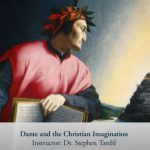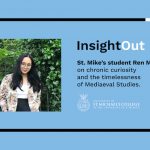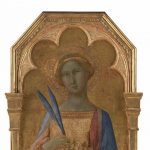St. Michael’s College offers first-year students the chance to join an exciting seminar that explores the intersection of the Christian faith with some of today’s most important questions.
For the academic year 2024–25, the Gilson Seminar will also be open to second-year students.
The Seminar consists of two half-courses, each featuring lectures, small-group discussions, and guest speakers. The Seminar is taught by Dr. Michael O’Connor, a professor in the College’s Christianity and Culture program and current holder of the Bennett Family Chair in Christianity and the Arts.
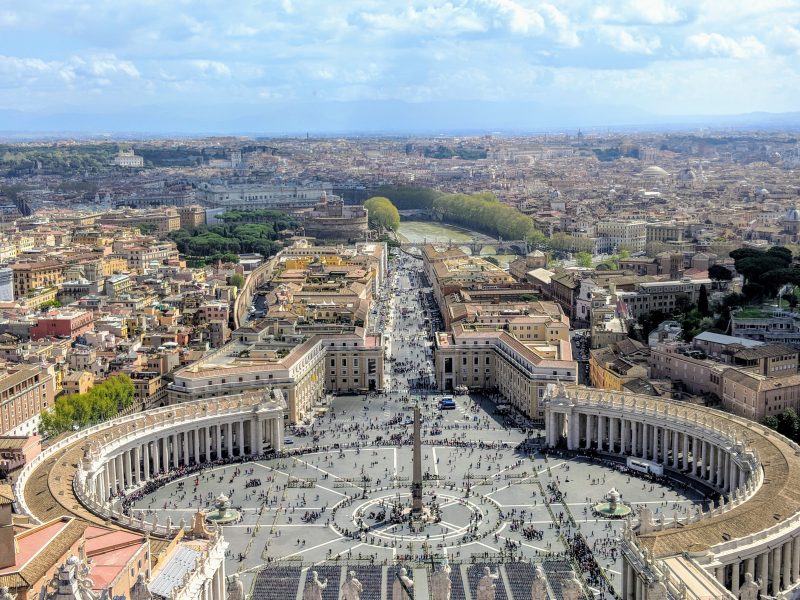
- Why should I enroll?
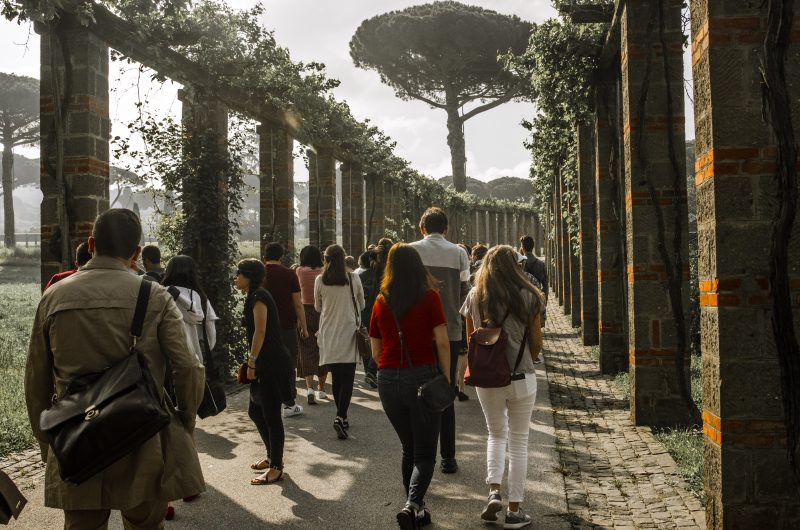
The Gilson Seminar introduces you to university-level studies on a small scale, with students who share an interest in international experience and in the relationship between ideas, art, and the Christian faith.
- What are the courses?

Here’s a look at the two half-courses:
Fall 2024: The Gilson Seminar in Faith and Ideas
This course will explore questions related to Christianity and ecology, science, literature, the arts, and politics. The course features a weekly lecture on a major topic and a small tutorial in which you will have a chance to explore the subject in greater depth. Throughout this course, you will have a chance to read, reflect, discuss, and write. You will receive 0.5 course credits for taking this course, which would be one of normally 5 courses that you would take in the Fall term.
Winter 2025: The Gilson Seminar in Faith and Rome
This course includes an eleven-day international learning experience in Rome, Italy, in May 2025, that explores the roles that the Catholic Church and Vatican have played in ecology, science, literature, the arts, and politics. The course features daily lectures and site-specific talks and tours in Rome and Assisi. You will have a chance to immerse yourself in the living history of one of the world’s great centres of belief and culture and in turn to reflect on, discuss, and write about this experience. You will receive 0.5 course credits for taking this course, which runs in the Winter term.
- What will I be reading?

Some of the material you’ll be reading could include selections from:
- St. Augustine’s Confessions, an autobiography about what it means to search for truth and to believe in God when not very many people think there’s a point to it.
- Dante’s Divine Comedy, the Italian poet’s arresting and beautiful meditation on justice and mercy, politics and ethics, faith and love.
- Gerard Manley Hopkins’s poems about creation and beauty, which were inspired by his life and travels as someone with vocations to both art and religious life.
- Dorothy Day’s The Long Loneliness, an autobiography about committing your life to social justice activism out of your belief in God.
- Laudato si’, Pope Francis’s teaching on the environment and what it means to care for each other and the Earth in a faith-based commitment.
- What about Rome—when do I go? Are there fees?
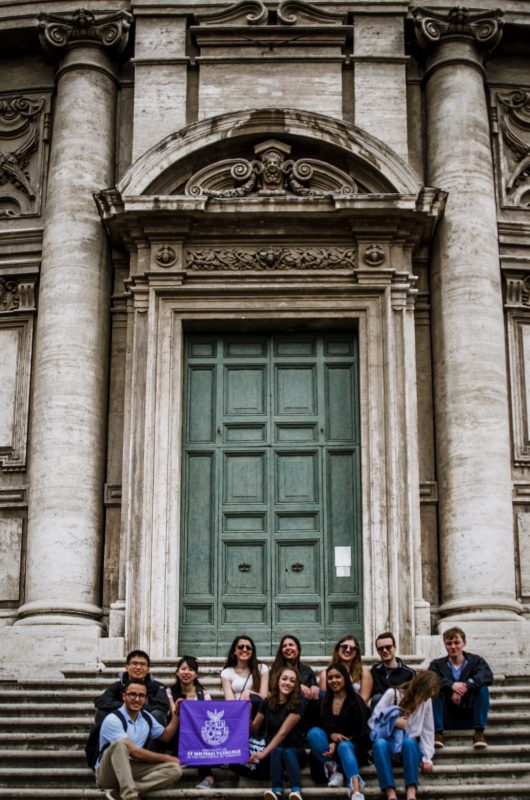
The travel portion of the Gilson Seminar in Faith and Rome takes place in Rome, Italy, in May 2025.
The Faith and Rome Seminar is based in the centre of Rome. In advance of the trip, you will receive more detailed information and also safety training and other preparation.
All students admitted to the Gilson Seminar in Faith and Rome are responsible for their own airfare and incidentals. The cost of room, board and programming comes out of your student account through an ancillary fee paid when you register for this course. The fee amount, subject to confirmation, will not be more than $3,000.
Please note that trip dates are subject to change. The University of St. Michael’s College follows the guidance of government health authorities and the Faculty of Arts and Science when arranging student travel.
If you have questions about the course, please email Michael Czobit at michael.czobit@utoronto.ca.
Program Requirements and Courses
The term “medieval” is the name given to a period in the history between “antiquity” and “modernity,” or roughly the fifth through the fifteenth centuries. Its parameters are broad and boundaries are not clearly defined. The Medieval Studies program adopts an interdisciplinary approach to exploring this world through the study of subjects such as the Latin language, art, literature, law, gender roles, and religion. As well as examining the medieval foundations of modern culture, students also explore “medievalisms” that appear in our own culture through such media as film, literature, drama, and art, and introduce new approaches including digital humanities.
The Medieval Studies program is open to undergraduate students registered in the Faculty of Arts & Science at the University of Toronto. Our courses are open to students registered at the University of Toronto.
Medieval Studies Program Overview
For more information
For any questions about our program or courses please contact smc.programs@utoronto.ca. Note that courses listed below are not offered every year. For current course details please see the Faculty of Arts and Science Timetable Builder.
Medieval Studies Specialist
An interdisciplinary treatment of the history, art, literature and thought of the Middle Ages.
Enrolment Requirements:
This is an open enrolment program. A student who has completed 4.0 credits may enrol in the program.
Completion Requirements:
(12.0 credits, including at least 4.0 credits at the 300+ level, 1.0 of which must be at the 400-level)
1. 0.5 credit from the introductory courses: MST210H1/ MST212H1/ SMC165H1/ SMC176Y1.
2. 2.0 credits from the foundational courses which provide further introduction into more specific aspects of Mediaeval Studies: CHC200H1/ CHC307H1/ CHC327H1/ CHC367H1/ MST222H1/ MST230H1/ MST231H1/ MST232H1/ MST233H1/ MST234H1/ MST242H1/ MST323H1/ MST328H1/ MST358H1/ MST359H1/ MST361H1/ SMC176Y1.
3. 2.0 credits from the following Latin courses: LAT101H1/ LAT102H1/ LAT201H1/ LAT202H1/ MST222H1/ MST323H1/ MST328H1/ MST436H1/ SMC176Y1.
4. 6.0 credits from the following elective courses, with at least 2.0 credits from courses with an SMC/CHC/CLT/MST designator. Students can choose courses from all four groups.
History:
MST201H1/ MST202H1/ MST211H1/ MST230H1/ MST231H1/ MST232H1/ MST233H1/ MST234H1/ MST300H1/ MST301H1/ MST340H1/ MST401H1/ MST442H1/ CHC215H1/ CHC322H1/ CLA378H1/ CLT337H1/ CLT338H1/ CLT344Y1/ HIS208Y1/ HIS220Y1/ HIS251Y1/ HIS320H1/ HIS321H1/ HIS322H1/ HIS323H1/ HIS336H1/ HIS403H1/ HIS424H1/ HIS426H1/ HIS427H1/ HIS428H1/ HIS432H1/ HIS434Y1/ HIS438H1/ HPS201H1/ HPS430H1/ NMC270H1/ NMC273Y1/ NMC275H1/ NMC342H1/ NMC376H1/ NMC377Y1/ SLA253H1/ SMC165H1
Thought:
MST200Y1/ MST210H1/ MST212H1/ MST213H1/ MST242H1/ MST324H1/ MST341H1/ MST359H1/ MST361H1/ CHC307H1/ CHC327H1/ CHC368H1/ CHC383H1/ CLA336H1/ CLT350H1/ MAT390H1/ PHL200Y1/ PHL205H1/ PHL206H1/ PHL303H1/ PHL304H1/ PHL307H1/ PHL308H1/ PHL309H1/ PHL336H1/ RLG241H1/ SMC188H1/ SMC189H1
Literature:
MST222H1/ MST226H1/ MST323H1/ MST328H1/ MST436H1/ CLT250H1/ CLT343H1/ CLT373H1/ CLT440H1/ CLT441H1/ CLT445H1/ ENG240Y1/ ENG300Y1/ ENG311H1/ ENG330H1/ ENG385H1/ FRE318H1/ FRE471H1/ ITA311H1/ ITA312H1/ ITA320H1/ LAT101H1/ LAT102H1/ LAT201H1/ LAT202H1/ NMC255H1/ NMC350H1/ SLA330H1/ SLA400H1/ SMC176Y1/ SMC441Y1/ SPA450H1
The Arts:
MST326H1/ MST358H1/ CHC200H1/ CHC367H1/ CLT344Y1/ FAH215H1/ FAH216H1/ FAH318H1/ FAH319H1/ FAH327H1/ FAH328H1/ FAH420H1/ FAH421H1/ FAH424H1/ FAH492H1
And from the intensive research courses with changing topics in the fourth year: MST406H1/ MST407Y1/ MST435H1/ SMC457H1
5. 0.5 credit from CHC232H1/ CHC370H1/ CHC371H1/ CHC383H1/ MST242H1/ MST341H1/ MST442H1/ SMC385H1 or 0.5 credit of 200+ level course from Breadth Requirement Category 5: The Physical and Mathematical Universes.
6. MST490Y1
Notes:
- Effective Fall 2021, courses associated with St. Michael’s College’s Mediaeval Studies, Christianity and Culture, and Celtic Studies programs will have the new “MST,” “CHC,” and “CLT” designators respectively.
- MST201H1, MST202H1, MST300H1 are offered through the Centre for Medieval Studies.
Medieval Studies Major
An interdisciplinary treatment of the history, art, literature and thought of the Middle Ages.
Enrolment Requirements:
This is an open enrolment program. A student who has completed 4.0 credits may enrol in the program.
Completion Requirements:
(7.0 credits, including at least 2.0 credits at the 300+ level, 0.5 of which must be at the 400-level)
1. 0.5 credit from the introductory courses: MST210H1/ MST212H1/ SMC165H1/ SMC176Y1.
2. 1.0 credit from the foundational courses which provide further introduction into more specific aspects of Medieval Studies: CHC200H1/ CHC307H1/ CHC327H1/ CHC367H1/ MST222H1/ MST230H1/ MST231H1/ MST232H1/ MST233H1/ MST234H1/ MST242H1/ MST323H1/ MST328H1/ MST358H1/ MST359H1/ MST361H1/ SMC176Y1.
3. 4.5 credits from the following elective courses, with at least 1.5 credits from courses with an SMC/CHC/CLT/MST designator. Students can choose courses from all four groups.
History:
MST201H1/ MST202H1/ MST211H1/ MST230H1/ MST231H1/ MST232H1/ MST233H1/ MST234H1/ MST300H1/ MST301H1/ MST340H1/ MST401H1/ MST442H1/ CHC215H1/ CHC322H1/ CLA378H1/ CLT337H1/ CLT338H1/ CLT344Y1/ HIS208Y1/ HIS220Y1/ HIS251Y1/ HIS320H1/ HIS321H1/ HIS322H1/ HIS323H1/ HIS336H1/ HIS403H1/ HIS424H1/ HIS426H1/ HIS427H1/ HIS428H1/ HIS432H1/ HIS434Y1/ HIS438H1/ HPS201H1/ HPS430H1/ NMC270H1/ NMC273Y1/ NMC275H1/ NMC342H1/ NMC376H1/ NMC377Y1/ SLA253H1/ SMC165H1
Thought:
MST200Y1/ MST210H1/ MST212H1/ MST213H1/ MST242H1/ MST324H1/ MST341H1/ MST359H1/ MST361H1/ CHC307H1/ CHC327H1/ CHC368H1/ CHC383H1/ CLA336H1/ CLT350H1/ MAT390H1/ PHL200Y1/ PHL205H1/ PHL206H1/ PHL303H1/ PHL304H1/ PHL307H1/ PHL308H1/ PHL309H1/ PHL336H1/ RLG241H1/ SMC188H1/ SMC189H1
Literature:
MST222H1/ MST226H1/ MST323H1/ MST328H1/ MST436H1/ CLT250H1/ CLT343H1/ CLT373H1/ CLT440H1/ CLT441H1/ CLT445H1/ ENG240Y1/ ENG300Y1/ ENG311H1/ ENG330H1/ ENG385H1/ FRE318H1/ FRE471H1/ ITA311H1/ ITA312H1/ ITA320H1/ LAT101H1/ LAT102H1/ LAT201H1/ LAT202H1/ NMC255H1/ NMC350H1/ SLA330H1/ SLA400H1/ SMC176Y1/ SMC441Y1/ SPA450H1
The Arts:
MST326H1/ MST358H1/ CHC200H1/ CHC367H1/ CLT344Y1/ FAH215H1/ FAH216H1/ FAH318H1/ FAH319H1/ FAH327H1/ FAH328H1/ FAH420H1/ FAH421H1/ FAH424H1/ FAH492H1
And from the intensive research courses with changing topics in the fourth year: MST406H1, MST407Y1, MST435H1, SMC457H1.
4. 0.5 credit from CHC232H1/ CHC370H1/ CHC371H1/ CHC383H1/ MST242H1/ MST341H1/ MST442H1/ SMC385H1 or 0.5 credit of 200+ level course from Breadth Requirement Category 5: The Physical and Mathematical Universes.
5. 0.5 credit from the following: MST406H1/ MST407Y1/ MST435H1/ MST436H1/ SMC457H1/ MST490Y1.
Notes:
- Effective Fall 2021, courses associated with St. Michael’s College’s Medieval Studies, Christianity and Culture, and Celtic Studies programs will have the new “MST,” “CHC,” and “CLT” designators respectively.
- MST201H1, MST202H1, MST300H1 are offered through the Centre for Medieval Studies.
Medieval Studies Minor
An interdisciplinary treatment of the history, art, literature and thought of the Middle Ages.
Enrolment Requirements:
This is an open enrolment program. A student who has completed 4.0 credits may enrol in the program.
Completion Requirements:
(4.0 credits including at least 1.0 credit at the 300+ level)
1. 0.5 credit from the introductory courses: MST210H1/ MST212H1/ SMC165H1/ SMC176Y1
2. 1.0 credit from the foundational courses: CHC200H1/ CHC307H1/ CHC327H1/ CHC367H1/ MST222H1/ MST230H1/ MST231H1/ MST232H1/ MST233H1/ MST234H1/ MST242H1/ MST323H1/ MST328H1/ MST358H1/ MST359H1/ MST361H1/ SMC176Y1
3. 2.5 credits from the foundational courses listed in requirement 2 above or from the elective courses listed in requirement 4 of the Specialist Program.
Notes:
- Effective Fall 2021, courses associated with St. Michael’s College’s Medieval Studies, Christianity and Culture, and Celtic Studies programs will have the new “MST,” “CHC,” and “CLT” designators respectively.
- MST201H1, MST202H1, MST300H1 are offered through the Centre for Medieval Studies.
For the most up-to-date course listings please see the Faculty of Arts and Science Timetable.
As of the 2021/2022 academic year all Medieval Studies courses will have new course codes. Both the old SMC program courses and new MST courses will count toward your Medieval Studies program requirements. If you notice a course not being counted in Degree Explorer please contact us at smc.programs@utoronto.ca.
The course re-coding is taking place across all St. Michael’s College courses. As of Fall 2021, Medieval Studies courses will be coded as MST courses, Celtic courses will be CLT courses, and Christianity and Culture courses will be CHC courses.
Medieval Studies Offerings
200 Level
MST210H1 – The Early Medieval Tradition
Previous Course Number: SMC210H1
Hours: 24L/12T
An introduction to the thought and culture of early medieval Europe. Students are introduced to important monuments of early mediaeval History, Thought, Literature, and Art. They follow some of the common threads that run through these disciplines and explore chief expressions of early mediaeval life and thought.
Exclusion: SMC210H1
Distribution Requirements: Humanities
Breadth Requirements: Thought, Belief and Behaviour (2)
MST211H1 – The Middle Ages and the Movies
Previous Course Number: SMC211H1
Hours: 24L/12T
This course examines the ways mediaeval themes have been presented in the cinema over the last century by taking exemplary films from different countries and epochs. The purpose is to explore each on three levels: the medieval reality, the subsequent legendary or literary elaboration, and the twentieth-century film rendition, regarded equally as work of art, ideology and economic product.
Exclusion: SMC211H1
Distribution Requirements: Humanities
Breadth Requirements: Creative and Cultural Representations (1)
MST212H1 – The Later Medieval Tradition
Previous Course Number: SMC212H1
Hours: 24L/12T
An introduction to the thought and culture of later medieval Europe. Students are introduced to important monuments of later medieval History, Thought, Literature, and Art. They follow some of the common threads that run through these disciplines and explore chief expressions of later medieval life and thought.
Exclusion: SMC212H1
Distribution Requirements: Humanities
Breadth Requirements: Thought, Belief and Behaviour (2)
MST213H1 – Dante and the Christian Imagination
Previous Course Number: SMC213H1
Hours: 24L
A study of selections from various works by Dante as an expression of the medieval imagination, viewed against the background of medieval Christian doctrine and psychology and in relation to various contemporary approaches to the study of medieval Christian culture.
Exclusion: SMC213H1
Distribution Requirements: Humanities
Breadth Requirements: Thought, Belief and Behaviour (2)
MST222H1 – Medieval Latin Literature
Previous Course Number: SMC222H1
Hours: 48S
This course studies a selection of Medieval Latin prose and poetry. Emphasis is on the linguistic differences between Medieval Latin and its classical antecedent, especially in regard to vocabulary, grammar and orthography. A review of Latin grammar is part of the course.
Prerequisite: SMC176Y1/LAT102H1
Exclusion: SMC222H1
Distribution Requirements: Humanities
Breadth Requirements: Creative and Cultural Representations (1)
MST226H1 – King Arthur
Previous Course Number: SMC226H1
Hours: 24L
A survey of the Arthurian legends from the earliest Latin histories through selected Welsh, French and German Romances to the English-language classic, Morte d’Arthur of Malory. Emphasis will be on reading the primary sources (in translation).
Prerequisite: 5.0 credits
Exclusion: SMC226H1
Distribution Requirements: Humanities
Breadth Requirements: Creative and Cultural Representations (1)
MST230H1 – The Middle Ages in Modern Life: Games, Television, and the Popular Imagination
Hours: 24L
Modern culture retains a fascination with the middle ages. In many cases, the Mediaeval world or more often ideas about the Mediaeval world, feature in modern entertainment, politics, or literature. This course explores the ways the middle ages have been interpreted and reinterpreted in various aspects of modern culture such as role playing games, videogames, television, literature, and iconography.
Distribution Requirements: Humanities
Breadth Requirements: Creative and Cultural Representations (1)
MST231H1 – On the Move in Mediaeval Eurasia
Hours: 24L
In this age of constant global travel, it is easy both to forget how much more complicated travel was in earlier periods, and to assume that there was very little of it. In the Mediaeval world, people travelled for work as traders, craftsmen and warriors; they travelled for their spirit as pilgrims; they travelled as migrants and refugees. This course will introduce students to the variety of people on the move in Mediaeval Eurasia, their motives, and the means they used to travel.
Distribution Requirements: Humanities
Breadth Requirements: Creative and Cultural Representations (1)
MST232H1 – How to Be a Barbarian: Beard, Battles and Belief at the Dawn of the Middle Ages
Hours: 24L
Barbarians have caught the modern popular imagination, and they appear to be much the same: hairy warriors who destroyed civilization. The late antique period (c.300–c.600) was a time of transition and the meetings of several cultures. This course examines the so-called barbarians who entered and soon came to rule the former Roman provinces of western Europe in this period. Our particular focus is the cultural, religious, artistic, and socio-economic aspects of barbarian peoples, and how these intersected with the civilization of Rome.
Distribution Requirements: Humanities
Breadth Requirements: Society and its Institutions (3)
MST233H1 – Viking Cultures
Hours: 24L
Everyone thinks they know who the Vikings were. Like many aspects of the middle ages popular in modern life, there is much that is inaccurate about this picture of the Vikings. This course explores how Vikings lived—what sorts of things they did for a living, how they amused and entertained themselves, and what they thought—and moves on to consider their rituals of death and their notions of the afterlife. It will be based both on reading a variety of texts produced by and about the Vikings, as well as looking at various objects they produced that have survived.
Distribution Requirements: Humanities
Breadth Requirements: Creative and Cultural Representations (1)
MST234H1 – Women’s Lives in Medieval Europe
Hours: 24L
Using an interdisciplinary lens, this course explores the experiences of Medieval women. Some attention will be given to subjects such as the idea of the Mediaeval feminine, holiness and femininity, and appropriate feminine behaviour. At the same time, we will look at the social and cultural roles of women in society for instance the gendered ideals of marriage, guild structures, and child rearing.
Distribution Requirements: Humanities
Breadth Requirements: Thought, Belief and Behaviour (2)
MST242H1 – Medieval Mythologies and Methodologies
Hours: 24L
The idea of the ‘middle ages’ is pervasive in Western thought, but only some of what is ‘traditional’ actually happened. This course introduces various interpretations, constrictions, and re-creations. Our analysis will draw on literary texts and their various interdisciplinary interpretations and applications.
Distribution Requirements: Humanities
Breadth Requirements: Creative and Cultural Representations (1)
300 Level
MST301H1 – Special Topics in Medieval Studies
Hours: 24L
A senior-level special topics seminar in Medieval Studies as determined by the instructor. Prerequisite: Completion of 9.0 credits
Recommended Preparation: MST210H1, MST212H1
Distribution Requirements: Humanities
MST323H1 – Medieval Latin Prose
Previous Course Number: SMC323H1
Hours: 48S
Comprising an immersion in Medieval Latin prose texts, this course gives students a deepened acquaintance with the linguistic features of Medieval Latin, as well as with its literature, and generic and stylistic conventions. A solid foundation in basic Latin morphology, syntax and vocabulary is assumed.
Prerequisite: LAT202H1/MST222H1
Exclusion: SMC323H1
Distribution Requirements: Humanities
Breadth Requirements: Creative and Cultural Representations (1)
MST324H1 – The Study of the Bible in the Middle Ages
Previous Course Number: SMC324H1
Hours: 24L/12T
This course explores medieval biblical commentary and the various approaches taken by the exegetes to uncover the secrets of the sacred page, for instance through the four senses of Scripture: history, allegory, tropology, and anagogy.
Exclusion: SMC324H1
Recommended Preparation: MST210H1/MST212H1
Distribution Requirements: Humanities
Breadth Requirements: Thought, Belief and Behaviour (2)
MST326H1 – Medieval Music: thought and practice
Previous Course Number: SMC326H1
Hours: 24L
An introduction to musical theory and practice in the middle ages: sacred and secular music, monophony and polyphony, performers and patrons, notation and orality. No prior background in music or ability to read music is required.
Prerequisite: CHC203Y1/SMC206H1/MST210H1/MST212H1/MUS111H1
Exclusion: SMC326H1
Distribution Requirements: Humanities
Breadth Requirements: Creative and Cultural Representations (1)
MST328H1 – Medieval Latin Poetry
Previous Course Number: SMC328H1
Hours: 48L
This course studies selections from the rich variety of Medieval Latin poetry, rhymed as well as rhythmic, and provides a survey of prosody and metrics. A solid foundation in basic Latin morphology, syntax and vocabulary is assumed.
Prerequisite: MST222H1/LAT202H1
Exclusion: SMC328H1
Distribution Requirements: Humanities
Breadth Requirements: Creative and Cultural Representations (1)
MST340H1 – Medieval Genders and Sexualities
Hours: 24L
This course explores ideas of gender and sexuality in the medieval world. In particular it examines the links between the two throughout history, the social religious, and literary ideas of marriage and reproduction. Through close readings of primary sources including literature, canon law, penitentials, sermons, and medical treatises, students will explore the boundaries between the worlds of biology and culture.
Prerequisite: Completion of 9.0 credits
Recommended Preparation: MST210H1, MST212H1
Distribution Requirements: Humanities
Breadth Requirements: Thought, Belief and Behaviour (2)
MST341H1 – Middle Ages by the Numbers
Hours: 24L
Numbers and their uses often appear to be absolute fact: a thousand dollars is exactly that, not more or less; and if you weigh fifty kilos, that’s what you weigh. But the use and meaning of numbers—for recording and counting dates, money, weights, distances, and myriad other functions—is not, in fact, devoid of cultural, historical, and political context. Medieval Europe provided a bewildering range of calendric systems, currencies, systems of measurement, and numerical symbolism was much used in art, music, religious thought, and literature. This course provides an introduction to the various uses of numbers in this period across different regions and cultural contexts.
Prerequisite: Completion of 9.0 credits
Recommended Preparation: MST210H1, MST212H1
Distribution Requirements: Humanities
Breadth Requirements: Society and its Institutions (3)
MST358H1 – The Medieval Book
Previous Course Number: SMC358H1
Hours: 24S
This course examines the most salient aspects of medieval manuscript culture. We will study, first, how the parchment for books was folded, pricked, ruled and bound, and second, what scripts were employed in the different codices. We will also examine the various types of books made in the Middle Ages and the challenges they pose to modern scholars.
Exclusion: SMC358H1
Recommended Preparation: LAT102H1, MST210H1/MST212H1 or a course in mediaeval history.
Distribution Requirements: Humanities
Breadth Requirements: Creative and Cultural Representations (1)
MST359H1 – Medieval Theology
Previous Course Number: SMC359H1
Hours: 24L
An introduction to the discipline of theology as taught in the medieval schools. Building on a basic knowledge of Christian scriptures and of philosophical argument, this course will offer an organic exposition of medieval theology, together with an introduction into the scientific method of theological investigation as practised in the Middle ages.
Exclusion: SMC359H1
Recommended Preparation: MST210H1/MST212H1
Distribution Requirements: Humanities
Breadth Requirements: Thought, Belief and Behaviour (2)
MST361H1 – Medieval Law
Previous Course Number: SMC361H1
Hours: 24S
Medieval jurisprudence combines the high technical quality of Roman law with the requirements of Christianity. The seminar provides an overview of the development of medieval learned jurisprudence; select texts from Roman and canon law, with their glosses, are read in order to explore more specifically the methods and concerns of mediaeval jurists.
Exclusion: SMC361H1
Recommended Preparation: HIS220Y1/MST210H1/MST212H1
Distribution Requirements: Humanities
Breadth Requirements: Thought, Belief and Behaviour (2)
400 Level
MST401H1 – Advanced Topics in Medieval Studies
Hours: 24L
In this course, students will have an opportunity to take a graduate seminar at the Centre for Medieval Studies, one of the world’s premier research institutions in the field. Depending on the nature of the seminar, the instructor, the SMC program coordinator, and the student will determine a method of assessment appropriate for an undergraduate student while still pushing the student’s boundaries to be able to participate in weekly discussions in a graduate seminar along with MA and PhD students. Course forms are available from the SMC Principal’s Office.
Prerequisite: MST210H1, MST212H1, 9.0 credits
Distribution Requirements: Humanities
Breadth Requirements: Society and its Institutions (3)
MST406H1 – Medieval Seminar II
Previous Course Number: SMC406H1
Hours: 12T/24S
A fourth-year seminar on a topic to be determined annually. Refer to the St. Michael’s College website for more information.
Prerequisite: 1.0 credit in MST courses
Recommended Preparation: MST210H1/MST212H1 or other mediaeval courses
Distribution Requirements: Humanities
MST407Y1 – Medieval Seminar I
Previous Course Number: SMC407Y1
Hours: 24T/48S
A fourth-year seminar on a topic to be determined annually. Refer to the St. Michael’s College website for more information.
Prerequisite: 1.0 credit in MST courses
Recommended Preparation: MST210H1/MST212H1 or other mediaeval courses
Distribution Requirements: Humanities
MST435H1 – Independent Studies in Medieval Studies
Previous Course Number: SMC435H1
An independent research project to be proposed by the student and supervised by a member of faculty affiliated with the Mediaeval Studies Program. Application forms are available from the SMC Principal’s Office. Not eligible for CR/NCR option.
Prerequisite: Completion of 10.0 credits and written approval of the Program Coordinator and Program Director
Distribution Requirements: Humanities
MST436H1 – Advanced Latin Seminar
Previous Course Number: SMC436H1
Hours: 24S
This seminar is devoted to the in-depth study of one or a number of related Medieval Latin text(s) in their linguistic, historical, and intellectual context. Readings in the original Latin will be discussed and commented upon by students.
Prerequisite: MST323H1/MST328H1
Recommended Preparation: MST210H1/MST212H1
Distribution Requirements: Humanities
Breadth Requirements: Creative and Cultural Representations (1)
MST442H1 – Medieval Skills and Methodologies
Hours: 24L
This course focuses on the skills and tools necessary for graduate research in medieval studies. It introduces palaeography, codicology, and diplomatics, as well as other lexical and conceptual tools needed for dealing with mediaeval primary sources.
Prerequisite: MST210H1, MST212H1, 9.0 credits
Recommended Preparation: MST242H1
Distribution Requirements: Humanities
Breadth Requirements: Society and its Institutions (3)
MST490Y1 – Senior Essay in Medieval Studies
Previous Course Number: SMC490Y1
Hours: 24S
A scholarly project chosen by the student in consultation with a faculty member and approved by the Program Coordinator. Arrangements for the choice of topic and supervisor must be completed by the student before registration. The project will be accompanied by a research seminar component. Not eligible for CR/NCR option.
Prerequisite: Completion of 10.0 credits and written approval of the Program Coordinator and Program Director
Distribution Requirements: Humanities
Breadth Requirements: Creative and Cultural Representations (1), Society and its Institutions (3)
St. Michael’s has long been celebrated for Medieval Studies, with an impressive history of renowned professors, rich resources, and an exciting interdisciplinary approach to studies. Students studying the art, culture, history and thought of the years between the fifth and fifteenth centuries graduate backed by the best of the Humanities and well prepared for a range of careers or further studies, including work at St. Michael’s own Faculty of Theology or the University of Toronto’s Centre for Medieval Studies (CMS).
Undergraduate students in the Faculty of Arts and Science at the University of Toronto, regardless of college affiliation, are invited to join our Specialist, Major, or Minor in Medieval Studies.
Medieval Studies Program Requirements and Courses
U of T’s FAS Academic Calendar and Timetable
Go to U of T’s FAS Academic Calendar for St. Michael’s College Courses and Program Information
See U of T’s Timetable Builder to find current course offering details
Introducing Medieval Studies Program Courses for 2025-2026
Proposed course offerings and information for the 2024/2025 academic year are detailed in the PDF below. For the most up-to-date course listings please see the Faculty of Arts and Science Timetable.
As of the 2021/2022 academic year all Medieval Studies courses have new course codes. Both the old SMC program courses and new CLT courses will count toward your Medieval Studies program requirements. If you notice a course not being counted in Degree Explorer please contact us at smc.programs@utoronto.ca.
The course re-coding is taking place across all St. Michael’s College courses. As of Fall 2021, Medieval Studies courses are coded as MST courses, Celtic courses are CLT courses, and Christianity and Culture courses are CHC courses.
Preliminary Medieval Studies Course Listings 2025-2026
Featured Courses/Seminars
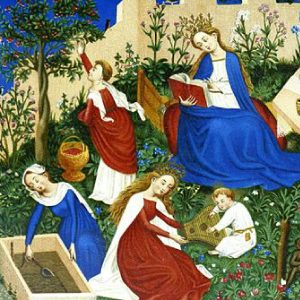
200 Level
MST226H1 King Arthur
Brent Miles
MST233H1 Viking Cultures
MST234H1F Women’s Lives in Mediaeval Europe
Alison More
(St. Michael’s)
MST242H1S Mediaeval Mythologies and Methodologies
Alison More
(St. Michael’s)
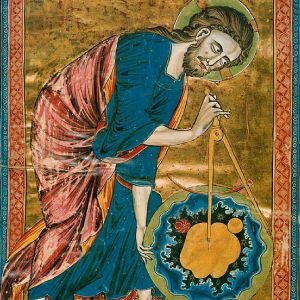
circa 1220-1230
300 Level
MST324H1 The Study of the Bible in the Middle Ages
Jim Ginther
(St. Michael’s)
MST326H1 Mediaeval Music: Thought and Practice
Michael O’Connor
(St. Michael’s College)
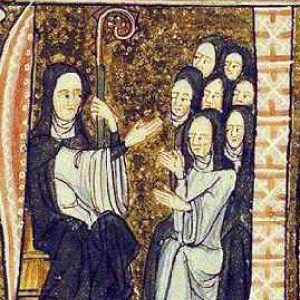
13th century
400 Level
MST406H1S Mediaeval Seminar II: Apocalypse: The End of the World in Mediaeval Thought
Alison More
Why Take Medieval Studies
The discipline known as Medieval Studies examines the mediaeval foundations of modern culture through history, thought, literature, and art. The program is an ideal example of the humanistic values of liberal education that reflect Catholic education at its best.
Students with a degree in Medieval Studies graduate with strong critical thinking skills and an awareness of cultural heritage, preparing them for a broad range of career paths, including professional studies in education, law, theology, museology, journalism, communication, politics, or graduate study in related fields including history, literature, archaeology, folklore, and library science.
By crossing traditional disciplinary boundaries and an intense study of a variety of cultural materials from the Middle Ages, students can improve their cultural literacy, cultivate their sense of internationalization, learn to use an unbounded array of theories and methodologies, and communicate with skill – qualities with important implications for civic engagement and good leadership.
Recent Mediaeval Studies News and Insights
Special to the Mediaeval Studies Program
A Leader in Teaching and Research in Mediaeval Disciplines
St. Michael’s well-deserved reputation for teaching and research in mediaeval disciplines is bolstered by the university’s John M. Kelly Library, which has rich resources in the field, including the Pontifical Institute of Mediaeval Studies (PIMS) collection. PIMS, located on the St. Michael’s campus, is Canada’s oldest research institute in the Humanities and is widely regarded as the birthplace of mediaeval studies in North America. Since its founding in 1929, the Institute has been associated with prominent scholars such as Étienne Gilson and Jacques Maritain and has provided training at the highest level in the fundamentals of mediaeval scholarship in languages, manuscript studies and related disciplines.
Photos courtesy of the University of St. Michael’s College Archives.
The Mediaeval Studies Undergraduate Society
Life as a Mediaeval Studies student is not only enhanced by small class sizes and access to professors, but it is further enriched via the Mediaeval Studies Undergraduate Society (MSUS), which provides regular social and academic activities for students throughout the school year. MSUS offers academic assistance and peer mentoring within the field of medieval studies and hosts campus-wide events such as a masquerade ball, seminars in mediaeval self-defence, medieval feasts, lectures, workshops and movie nights. During COVID, the group also arranged virtual tours of Oxford’s Bodleian Library, the Aga Khan Museum and the Art Gallery of Ontario.
For more information about MSUS:
Program Faculty and Contacts
Faculty
Alison More, Assistant Professor, Comper Professorship of Medieval Studies
alison.more@utoronto.ca
Michael O’Connor, Associate Professor
michael.oconnor@utoronto.ca
Giulio Silano, Professor
gsilano@chass.utoronto.ca
Ann Dooley, Professor Emerita
ann.dooley@utoronto.ca
Joseph Goering, Professor Emeritus
goering@chass.utoronto.ca
Kelly Library Liaison
Richard Carter, Librarian
Kelly Library, Room 127
416-926-1300 ext. 3444
richard.carter@utoronto.ca
Contact Richard Carter with any library-related questions, including using online resources, arranging library instruction, ordering new titles, and getting help with research.
St. Michael’s College Programs
For more information about the program, including queries about enrollment and completion, contact smc.programs@utoronto.ca
Learn more about Mediaeval Studies Program Requirements and Courses
Mediaeval Studies Program Requirements and Courses
U of T’s FAS Academic Calendar and Timetable
Go to U of T’s FAS Academic Calendar for St. Michael’s College Courses and Program Information
See U of T’s Timetable to find current course offering details
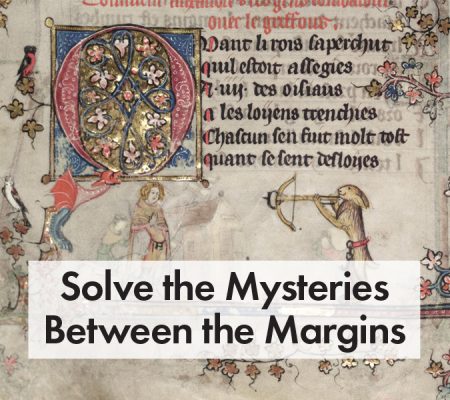
The Boyle Seminar brings first-year students to the intersection of Celtic and mediaeval cultures. The Seminar, inspired by the work of Fr. Leonard Boyle, an internationally renowned scholar of manuscripts and long-time figure on St. Michael’s College campus, invites students to investigate layers of history, analyse mediaeval books, and take language instruction in Latin or Irish.
Through lectures, seminars, language instruction, workshops, and guest speakers, students will study texts and their stories in their own times and over the centuries.
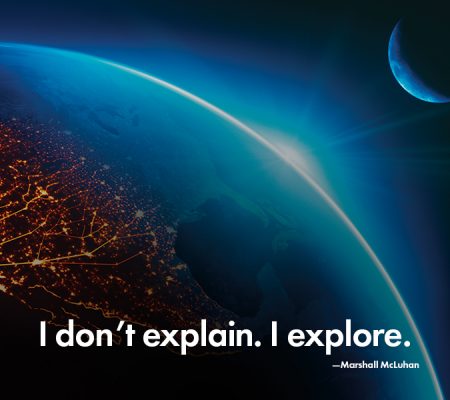
St. Mike’s McLuhan Seminar is an exploration of the relationship between creativity and technology. Marshall McLuhan (1911-1980), one of the most charismatic and wide-ranging thinkers of the 20th century, taught at St. Mike’s from 1946 until his death in 1980.
The Seminar is inspired by McLuhan’s innovative thinking. First-year students will explore how the humanities relate to other fields of thought in addressing the individual, social, and cultural experiences and effects of technological innovation.

- What is the course?
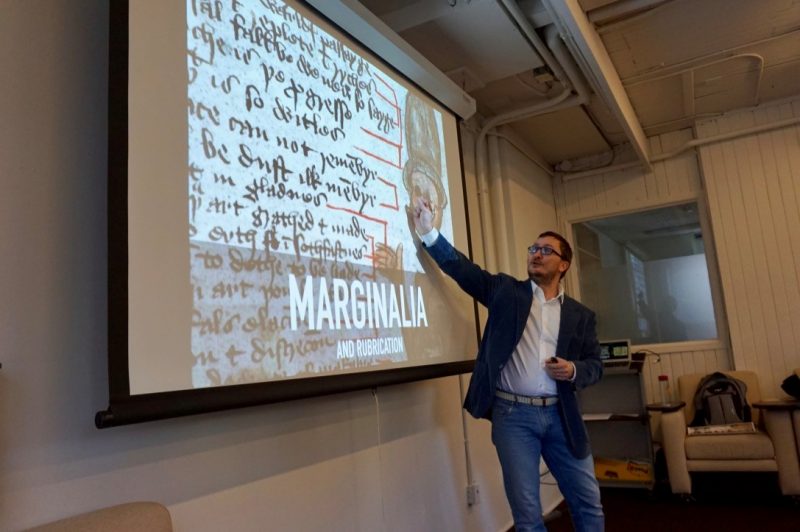
The McLuhan Seminar in Creativity and Technology course consists of lectures, seminar discussions, and guest speakers. You will explore how creativity makes innovation possible and influences our individual and social responses to technological change.
- What will I be reading?
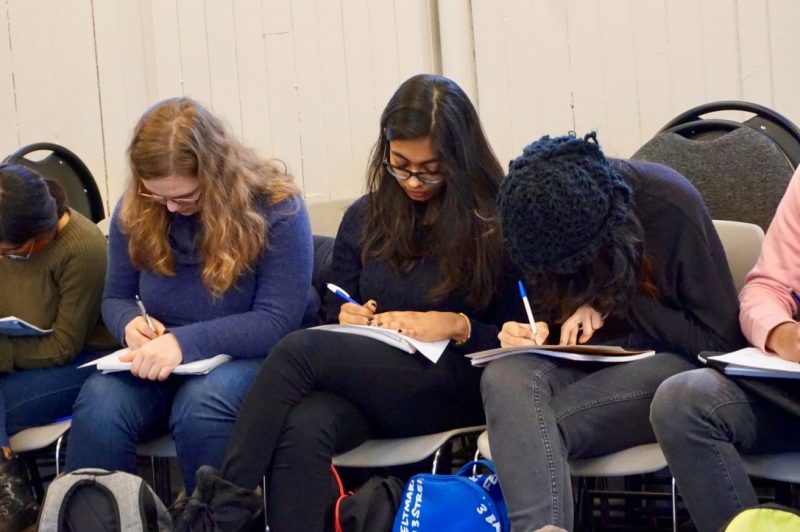
Some of the material you’ll be reading could include selections from:
• Marshall McLuhan’s Laws of Media: The New Science and Take Today: The Executive as Dropout
• Adam Grant’s Originals: How Non-Conformists Move the World, a book about recognizing good ideas, facing doubt, and choosing how and when to act
• Walter Isaacson’s bestselling biography Steve Jobs
• Ashlee Vance’s Elon Musk: Tesla, SpaceX, and the Quest for a Fantastic Future, a biography that explores the role of inventors and entrepreneurs in the global market
• Timothy Ferriss’ Tools of Titans: The Tactics, Routines, and Habits of Billionaires, Icons, and World-Class Performers
• Silicon Valley (HBO TV series)
Christians claim that the Gospel has the power to transform not only individual lives but whole societies. The Christianity and Culture Program offers students an opportunity to explore this bold claim through critical, academic studies of how the Christian faith has shaped—and been shaped by—the institutions, artistic expressions, and intellectual achievements of Western and world cultures. Courses provide a comprehensive and humanistic approach to Christian experience, past and present. By focusing on students’ personal engagement with primary sources, the Program fosters scholarly exchange, intellectual community, and a shared search for meaning.
Individual courses focus on art, literature, science, philosophy, theology, ritual, law, and social and institutional history. The program addresses the broad range of Christian experience, with a particular emphasis on the Catholic tradition.
Christianity and Culture is a good preparation for a career in education, journalism, arts and entertainment, or communications. Many of our students proceed to graduate work in theology and religious studies.For students anticipating teaching careers in Ontario Catholic schools, certain of the Christianity and Culture courses have been judged by the Ontario English Catholic Teachers Association as providing equivalent standing in ministry courses required for permanent teachers’ contracts.
The Christianity and Culture Program is open to undergraduate students in the Faculty of Arts and Science at the University of Toronto, and students from across the University are welcome to join our classes.- Special to our Program
C&C Social Club
A social club for students, faculty, staff and alumni associated with the program which sponsors a range of enjoyable events that encourage members to consider the place of Christianity in cultures past and present, including lectures, discussion, films, and cultural outings.
Saeculum
Saeculum is an undergraduate journal for the study of Christianity and Culture edited, produced, and published by the students in the program.
Christianity and the Arts Lecture
The Christianity and the Arts Lecture is an annual public lecture, held in April, by a scholar or practitioner in the field of Christianity and literature, music, poetry. The 2017 lecture on The Church and Contemporary Art was given by Bishop Paul Tighe, Adjunct Secretary of the Pontifical Council for Culture, Rome.
Previous lecturers include Pier Giorgio di Cicco (poet), John Bentley Mays (art and architecture critic), Philip Marchand (literary critic), the late Richard Bradshaw (conductor and general director of the Canadian Opera Company), Ted Rettig (sculptor), James MacMillan (composer), Sarah Hall (stained glass artist), Claire Keegan (writer), Peter Togni (musician and broadcaster), Thomas Dilworth (University of Windsor), Katharine Lochnan (curator at the AGO), Rev. Dan Donovan (St. Michael’s College), Sr. Rose Pacatte (film critic and Director of the Pauline Center for Media Studies), and Marianne McKenna (architect).
- 2025-2026 Program Requirements: Major and Minor
You are responsible for fulfilling the program requirements of the year you first joined the Christianity and Culture program. Both the CHC and SMC program courses you have completed count toward your program requirements. Please check your specific program requirements and progress on Degree Explorer.
For the most up-to-date requirements and current course offerings, please see the University of Toronto Timetable Builder and Faculty of Arts & Science Calendar.
If you have any questions, please contact us at smc.programs@utoronto.ca.
- 2025-2026 Program Requirements: Minor in Christianity and Education
You are responsible for fulfilling the program requirements of the year you first joined the Christianity and Education Minor. Both the CHC and SMC program courses you have completed count toward your program requirements. Please check your specific program requirements and progress on Degree Explorer.
For the most up-to-date requirements and current course offerings, please see the University of Toronto Timetable Builder and Faculty of Arts & Science Calendar.
If you have any questions, please contact us at smc.programs@utoronto.ca.
CHRISTIANITY AND EDUCATION MINOR REQUIREMENTS 2024-2025
- Course Offerings 2025-2026
Proposed course offerings and information for the 2023/2024 academic year are detailed in the PDF below. For the most up-to-date course listings please see the Faculty of Arts and Science Timetable.
As of the 2021/2022 academic year all Christianity and Culture courses have new course codes. Both the old SMC program courses and new CHC courses will count toward your Christianity and Culture program requirements. If you notice a course not being counted in Degree Explorer please contact us at smc.programs@utoronto.ca.
The course re-coding is taking place across all St. Michael’s College courses. As of Fall 2021, Mediaeval Studies courses will be coded as MST courses, Celtic courses will be CLT courses, and Christianity and Culture courses will be CHC courses.
Preliminary Christianity and Culture Course Listing 2025-2026
- Program Contacts
Faculty
Michael O’Connor, Associate Professor, Program Coordinator
Odette Hall, room 123
Rev. Daniel Donovan, Professor Emeritus
Odette Hall, room 028
Giulio Silano, Professor
Odette Hall, room 118
Reid Locklin, Associate Professor
Odette Hall, room 130
Adam Hincks, Assistant Professor
Odette Hall, Room 120
adam.hincks@utoronto.caJean-Olivier Richard, Assistant Professor
Queens Park Building (PIMS), room 48
jeanolivier.richard@utoronto.ca
Stephen Tardif, Assistant Professor (on leave 2023/2024)
Queens Park Building (PIMS), room 49
Kelly Library Liaison
Noel McFerran
Kelly Library, room 208C
416-926-1300 ext. 3472
noel.mcferran@utoronto.caContact Noel with any library-related questions, including using online resources, arranging library instruction, ordering new titles, and getting help with research.
SMC Programs
For more information about the program, including queries about enrollment and completion, contact smc.programs@utoronto.ca.
Celtic Studies is a renowned, interdisciplinary program that focuses on the rich history, mythology, literature, politics, languages, and culture of Scotland, Ireland, and Wales. The program is open to all undergraduates in the Faculty of Arts and Science at the University of Toronto.
Celtic Studies attracts visiting professors from across the world, is home to a very popular speaker series, and hosts numerous co-curricular events centred around language, sport, food, and culture. Every year, the program summer scholarships for students to study across the Atlantic. We are delighted to provide intellectually stimulating courses in a personal, student-friendly learning environment. Many of our students have gone on to graduate study in Celtic Studies, English literature, History, Medieval Studies, Archaeology, Politics… and more!
- Special to our Program
Celtic Studies Course Union
The Celtic Studies Course Union aims to unite students enrolled in the Celtic Studies program and classes. The union provides a social environment for students with common interests through free lectures and events like music sessions, movie nights, dances, and professor/student socials.
Garm Lu
Garm Lu is a Canadian Celtic Arts Journal published by the Celtic Studies Course Union. It showcases Canadian-Celtic works, ranging from papers to poems and photos and has been in print since 1986.
- Scholarships and Awards
Denis Leyne Celtic Studies Scholarship
To provide financial assistance to undergraduate students enrolled in the Celtic Studies Program at St. Michael’s College.
Value: Approx. $600-$700
Application- In-course Application
The John Ward McGovern and Irene J. McGovern Scholarship in Celtic Studies
Value $5000, open only to students registered at St. Michael’s College.
This scholarship is awarded to a registered full-time student at St. Michael’s College who will have completed their second year or higher of an undergraduate program by May 2024, and whose course of study involves a concentration or major focus in Celtic Studies. Students qualifying for the scholarship will have high academic achievement, particularly in the areas of Celtic History and Literature.
Application- In-course Award Application
The Eileen Allen Scholarship
Open to all students in the Faculty of Arts and Science who are registered in Celtic Studies courses.
This scholarship is awarded to a student who wishes to attend the Annual Conference of the Canadian Association for Irish Studies. Information regarding the conference can be obtained from the Celtic Studies Office or from the Canadian Association for Irish Studies.
The 2025 Annual Conference will take place in Toronto from June 11th-13th. The confirmed keynote speakers are: Prof Katy Hayward, Dr Garrett Carr, and Dr Anna Teekell.
Application:
Deadline is March 11th, 2025 at 5 p.m.
St. Michael’s College Scholarships for Summer Study
Open to all students in the Faculty of Arts and Science who are registered in Celtic Studies courses.
These scholarships are funded by St. Michael’s College and are available to students who wish to study overseas during the summer. The staff of the Celtic Studies Program must approve the course of study requested by the student. Information on various summer school options is available at the Celtic Studies Office.
Students who are applying to attend the Irish Summer Language School in An Cheathrú Rua, Co. Galway may be eligible for the Ireland Canada University Foundation scholarship. The successful students will be selected from the applicants for the St. Michael’s College Summer Scholarship and do not need to submit a separate application. Likewise students who wish to attend a Summer School in Scotland may be eligible for the St. Andrew’s Society of Toronto scholarship; the successful student will be selected from the applicants for the St. Michael’s College Summer Scholarship.
- 2025-2026 Program Requirements: Specialist
Enrolment Requirements:
Enrolment in the Celtic Studies Specialist will be administratively suspended as of January 1, 2024 and students will no longer be able to enrol in the program. Students presently enrolled in the Specialist will be able to complete the program requirements as described below. Students who are not enrolled in the Specialist but are interested in Celtic Studies are strongly recommended to consult St. Michael’s College for advising, as well as consider pursuing the Celtic Studies Major or Minor instead.You are responsible for fulfilling the program requirements of the year you first joined the Celtic Studies program. Both the CLT and SMC program courses you have completed count toward your program requirements. Please check your specific program requirements and progress on Degree Explorer.
For the most up-to-date requirements and current course offerings, please see the University of Toronto Timetable Builder and Faculty of Arts & Science Calendar.
If you have any questions, please contact us at smc.programs@utoronto.ca
Examines the literature, languages, history, music, folklore and archaeology of the peoples of Ireland, Scotland and Wales in the ancient and modern worlds, including the transmission of Celtic traditions to Canada and the United States.
Enrolment Requirements:
This is an open enrolment program. A student who has completed 4.0 credits may enrol in the program.
Completion Requirements:
(10.5 credits including 4.0 credits at the 300+level, 1.0 of which must be at the 400-level)
2. 2.0 credits from the following language courses: CLT141Y1/ CLT242Y1/ CLT243Y1/ CLT251H1/ CLT252H1/ CLT331H1/ CLT332H1
3. 6.0 credits from the list above and/or SMC165H1/ MST226H1/ CLT250H1/ CLT333H1/ CLT334H1/ CLT335Y1/ CLT337H1/ CLT338H1/ CLT341H1/ CLT342Y1/ CLT343H1/ CLT344Y1/ CLT345H1/ CLT346H1/ CLT347H1/ CLT348H1/ CLT350H1/ CLT351H1/ CLT355H1/ CLT356H1/ CLT373H1/ CLT374H1/ CLT375H1/ CLT376H1/ CLT377H1/ CLT378H1/ CLT395Y1/ CLT396H1/ CLT411H1/ CLT412H1/ CLT413H1/ CLT416H1/ CLT440H1/ CLT441H1/ CLT444H1/ CLT445H1/ SMC441Y1/ SMC457H1
4. CLT451Y1
5. 0.5 credit from CLT341H1/ CLT348H1/ CLT377H1/ CLT378H1/ CLT444H1/ CHC232H1/ CHC370H1/ CHC371H1/ CHC383H1/ MST341H1/ SMC385H1 or 0.5 credit 200+ level from Breadth Requirement Category 5: The Physical and Mathematical Universes.
Note: Effective Fall 2021, courses associated with St. Michael’s College’s Celtic Studies, Christianity and Culture, and Mediaeval Studies programs will have the new “CLT,” “CHC,” and “MST” designators respectively.
- 2025-2026 Program Requirements: Major
Examines the literature, languages, history, music, folklore and archaeology of the peoples of Ireland, Scotland and Wales in the ancient and modern worlds, including the transmission of Celtic traditions to Canada and the United States.
Enrolment Requirements:
This is an open enrolment program. A student who has completed 4.0 credits may enrol in the program.Completion Requirements:
(6.5 credits, including at least 2.0 credits at the 300+level, of which 0.5 credit must be at the 400-level)2. 4.0 credits from the list below: CLT110H1/ CLT141Y1/ CLT242Y1/CLT243Y1/ CLT251H1/ CLT252H1/ CLT331H1/ CLT332H1/ CLT333H1/ CLT337H1/ CLT338H1/ CLT339H1/ CLT340H1/ CLT341H1/ CLT345H1/ CLT346H1/ CLT347H1/ CLT348H1/ CLT350H1/ CLT353H1/ CLT374H1/ CLT378H1/ CLT395Y1/ CLT396H1/ CLT411H1/ CLT413H1/ CLT420H1/ CLT440H1/ CLT441H1/ SMC165H1/ SMC441Y1/ SMC457H1/ MST226H1
3. 0.5 credit from CLT341H1/ CLT348H1/ CLT377H1/ CLT378H1/ CLT418H1/ CLT444H1/ CHC232H1/ CHC370H1/ CHC371H1/ CHC383H1/ MST341H1/ SMC385H1 or a 0.5 credit at the 200/300/400-level from Breadth Requirement Category 5: The Physical and Mathematical Universes.
- 2025-2026 Program Requirements: Minor
Examines the literature, languages, history, music, folklore and archaeology of the peoples of Ireland, Scotland and Wales in the ancient and modern worlds, including the transmission of Celtic traditions to Canada and the United States.
Enrolment Requirements:
This is an open enrolment program. A student who has completed 4.0 credits may enrol in the program.Completion Requirements:
4.0 credits chosen from those listed below, including at least 1.0 credit at the 300+ levelCLT110H1/ CLT141Y1/ CLT242Y1/ CLT243Y1/ CLT244H1/ CLT251H1/ CLT252H1/ CLT331H1/ CLT332H1/ CLT333H1/ CLT336H1/ CLT337H1/ CLT338H1/ CLT339H1/ CLT340H1/ CLT341H1/ CLT345H1/ CLT346H1/ CLT347H1/ CLT348H1/ CLT350H1/ CLT353H1/ CLT374H1/ CLT378H1/ CLT395Y1/ CLT396H1/ CLT411H1/ CLT413H1/ CLT420H1/ CLT440H1/ CLT441H1/ SMC165H1/ SMC441Y1/ SMC457H1/ MST226H1
- Course Offerings 2025-2026
Proposed course offerings and information for the 2025/2026 academic year are detailed in the PDF below. For the most up-to-date course listings please see the Faculty of Arts and Science Timetable.
As of the 2021/2022 academic year all Celtic Studies courses have new course codes. Both the old SMC program courses and new CLT courses will count toward your Celtic Studies program requirements. If you notice a course not being counted in Degree Explorer please contact us at smc.programs@utoronto.ca.
The course re-coding is taking place across all St. Michael’s College courses. As of Fall 2021, Mediaeval Studies courses are coded as MST courses, Celtic courses are CLT courses, and Christianity and Culture courses are CHC courses.
- Program Contacts
Faculty
Irene Morra, Professor and Program Director
Odette Hall, room 127
Mark G. McGowan, Professor
Brent Miles, Associate Professor and Program Coordinator
Odette Hall, room 025
brent.miles@utoronto.caOdette Hall, room 027
pa.sheehan@utoronto.caDavid A. Wilson, Professor
Odette Hall, room 021
david.wilson@utoronto.caAnn Dooley, Professor Emerita
Odette Hall, room 023
ann.dooley@utoronto.caKelly Library Liaison
Richard Carter
Kelly Library, room 127
416-926-1300 ext. 3444
richard.carter@utoronto.caContact Richard with any library-related questions, including using online resources, arranging library instruction, ordering new titles, and getting help with research.
SMC Programs
For more information about the program, including queries about enrollment and completion, contact smc.programs@utoronto.ca.
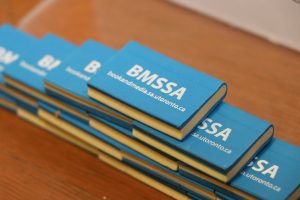
The Book & Media Studies program is open to undergraduate students in the Faculty of Arts and Science at the University of Toronto. This program studies how the tools with which humans have communicated – whether they’re illustrated manuscripts, radio broadcasts, propaganda posters, musical performances, digital media, or AI – shape ideas and societies. Examining various forms of media throughout history and into the modern age, the program takes a global perspective as it asks: how do these media forms influence how we understand the world, ourselves, and our relationship with each other? Students are provided with exciting opportunities to experiment with the latest AI, to study with renowned journalists, and to work hands-on with printing presses.
The program prepares students for vocations in journalism, publishing, editing, communications and graduate programs in information and library science. The program also introduces them to topics in the Book History and Print Culture Graduate program at the University of Toronto.
The new Arts & Science Internship Program (ASIP) stream is available to students entering their second year of study in and enrolled in the Book & Media Studies Major. In exceptional circumstances, students, including transfer students, who enrolled in the Book & Media Studies Major after Year 2, may also be admitted to the ASIP stream the Fall of Year 3. Acceptance into an ASIP stream in Year 3 is dependent on space and requires approval of the student’s academic unit and the Faculty of Arts & Science Experiential Learning & Outreach Support (ELOS) Office. Please refer to the ASIP Eligibility page on the Faculty of Arts & Science website for further details.
For more information and a complete list of courses, please check out the Faculty of Arts & Science Academic Calendar.

